一般现在时(课堂PPT)
- 格式:ppt
- 大小:1.28 MB
- 文档页数:46
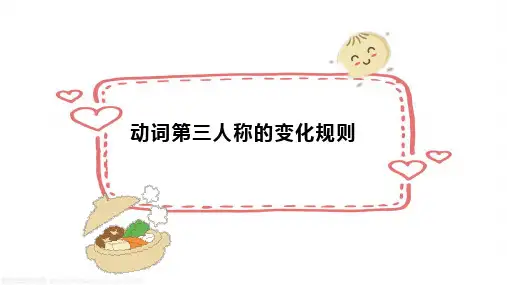
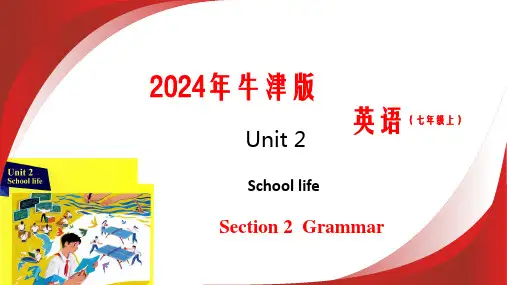
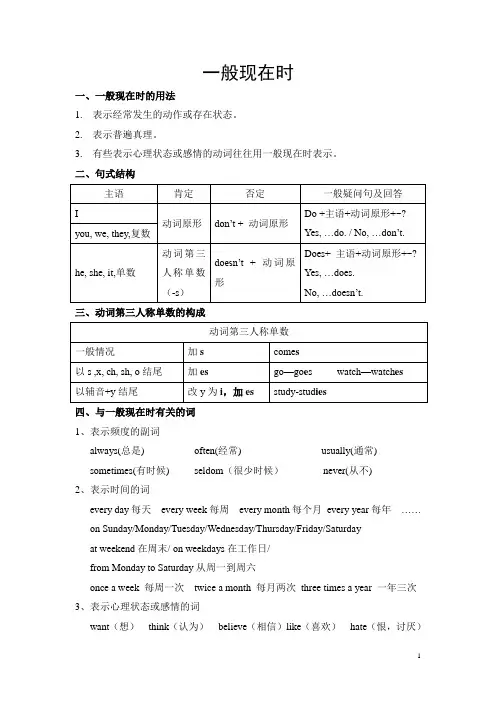
一般现在时一、一般现在时的用法1.表示经常发生的动作或存在状态。
2.表示普遍真理。
3.有些表示心理状态或感情的动词往往用一般现在时表示。
二、句式结构三、动词第三人称单数的构成四、与一般现在时有关的词1、表示频度的副词always(总是) often(经常) usually(通常)sometimes(有时候) seldom(很少时候)never(从不)2、表示时间的词every day每天every week每周every month每个月every year每年……on Sunday/Monday/Tuesday/Wednesday/Thursday/Friday/Saturdayat weekend在周末/ on weekdays在工作日/from Monday to Saturday从周一到周六once a week 每周一次twice a month 每月两次three times a year 一年三次3、表示心理状态或感情的词want(想)think(认为)believe(相信)like(喜欢)hate(恨,讨厌)一般现在时课堂练习一、将下列动词改为第三人称单数形式1.sing2.each3.play4.worry5.buy6.speak7.take8.see9.go10.study11.wash12.watch13.do14.make二、用do, does, don’t和doesn’t填空1.He ___________ speak English. Please speak Chinese to him.2.A: ___________ you get up very early every day?B: Yes, I ___________.3.A: ___________ she always clean the classroom with you?B: No, she ___________.4.A: ___________ they know Mr Gray?B: Yes, they ___________.5.A: ___________ Mr Li teach maths?B: No, he ___________.6.A: ___________ you usually go to work at six?B: No, I ___________.7.We ___________ want these film tickets. Give them to Mr Wang.8.I ___________ want any cake. I’m not hungry.9.A: Where ____________ your father work? ___________he work in a hospital?B: No. He ___________ work in a hospital. He is a teacher.10.A: ___________ the children get up early in summer?B: No, they ___________. They get up late.11.A: What ball games ___________ they play in summer?B: They ___________ play ball games. They swim in summer.12.My teacher ___________ like video games. She says they are for children.13.A: Look, I’ve got two plates. Which one ___________ you want?B: I ___________ have much food. I want the small one.三、用动词的适当形式填空1.He ___________(play) table tennis on Saturday.2.He ___________(get) a postcard from his sister every month.3.___________ your father ___________(work) on Sunday?4.Tom and Bill ___________(go) over their lessons in the evening.5.She ___________(not speak) English. She ___________(speak) French.6.Tony ___________(go) to Shanghai Library with his mother on Sunday.四、将下列句子改为否定句和一般疑问句,然后回答1.My friends come from America.______________________________________________________________ ______________________________________________________________ ______________________________________________________________ 2.She sees a film every week.______________________________________________________________ ______________________________________________________________ ______________________________________________________________ 3.My brother reads English every morning.______________________________________________________________ ______________________________________________________________ ______________________________________________________________ 4.They go to visit Mr Li every week.______________________________________________________________ ______________________________________________________________ ______________________________________________________________ 5.Her mother buys flowers every month.______________________________________________________________ ______________________________________________________________ ______________________________________________________________一般现在时课后练习一一、将下列动词改为第三人称单数形式1.buy2.study3.wash4.read5.help6.meet7.dance8.play9.close10.work11.mop12.teach13.worry14.say15.watche二、填入适当的词1. A: _________ Mr Smith speak English?B: Yes, _________ _________.2. A: _________ you teach French?B: No, _________ _________.3. A: _________Ann work in a university?B: No, _________ _________.4. A: _________ we have an English class in the afternoon?B: Yes, _________ _________.5. A: _________ the clock keep good time?B: Yes, _________ _________.6. A: _________ your brother and sister work in Canada?B: Yes, _________ _________.7. A: _________ you often meet at that place?B: No, _________ _________.8. A: _________ we have postcards at home?B: No, _________ _________.三、用动词的适当形式填空1.____________ he ____________(like) movies? Yes, he ____________. He____________ (see) a film every week.2.A: When ____________ they ____________(play) football?B: Every Wednesday afternoon.3.She ____________(speak) very good French. Her father and brother____________(speak) French, too.4.A: When ____________the plane ____________(leave) for Hangzhou?____________it ____________(leave) at 8:35?B: Sorry, I don’t know.5.We ____________(sing) an English song every day.6.Why ____________ you ____________(get up) very early every morning?7.A: How much ____________ the T-shirt ____________(cost)?B: 25 yuan.四、将下列句子改为否定句和一般疑问句,然后回答1.Bill does his homework in the afternoon.__________________________________________________________________________________________________________________________________________________________________________________________ 2.Tom plays in the park on Sunday.__________________________________________________________________________________________________________________________________________________________________________________________ 3.His father goes to Beijing every year.__________________________________________________________________________________________________________________________________________________________________________________________ 4.They go to see a film every week.__________________________________________________________________________________________________________________________________________________________________________________________ 5.My brother does some washing every day.__________________________________________________________________________________________________________________________________________________________________________________________一般现在时课后练习二将下列句子改为否定句和一般疑问句,然后回答1.Jane goes over her lessons in the evening.(肯定回答)______________________________________________________________ ______________________________________________________________ 2.The students plant some trees every year. (肯定回答)______________________________________________________________ ______________________________________________________________ 3.Frenk takes a bus to go to work. (肯定回答)______________________________________________________________ ______________________________________________________________ 4.He wants to borrow the book on that desk. (肯定回答)______________________________________________________________ ______________________________________________________________ 5.I like bananas very much. (肯定回答)______________________________________________________________ ______________________________________________________________ 6.I want to buy a pair of sports shoes. (肯定回答)______________________________________________________________ ______________________________________________________________ 7.Lucy draws pictures every Sunday. (肯定回答)______________________________________________________________ ______________________________________________________________ 8.Mary has a class meeting every Monday. (肯定回答)______________________________________________________________ ______________________________________________________________ 9.Mike does his homework by himself. (肯定回答)______________________________________________________________ ______________________________________________________________10.Mr White often goes to his office by car. (否定回答)______________________________________________________________ ______________________________________________________________ 11.My deskmate has sports after school. (否定回答)______________________________________________________________ ______________________________________________________________ 12.My sister does her homework every evening. (否定回答)______________________________________________________________ ______________________________________________________________ 13.My sister goes to work by bike every day. (否定回答)______________________________________________________________ ______________________________________________________________ 14.Our class teacher has lunch with us. (否定回答)______________________________________________________________ ______________________________________________________________ 15.The train leaves for Beijing at 3:25 p.m. (否定回答)______________________________________________________________ ______________________________________________________________ 16.They get up at six every morning. (否定回答)______________________________________________________________ ______________________________________________________________ 17.They have four classes every morning. (否定回答)______________________________________________________________ ______________________________________________________________ 18.This book costs me ten yuan. (否定回答)______________________________________________________________ ______________________________________________________________ 19.We go to school at ten past seven. (否定回答)______________________________________________________________ ______________________________________________________________。
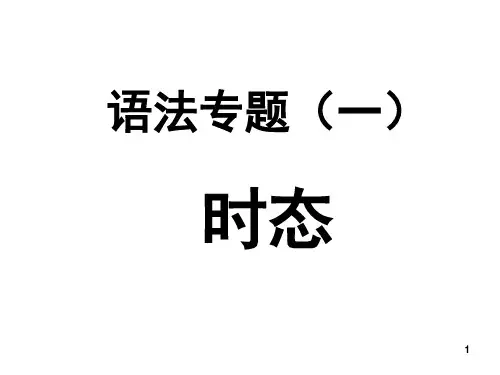
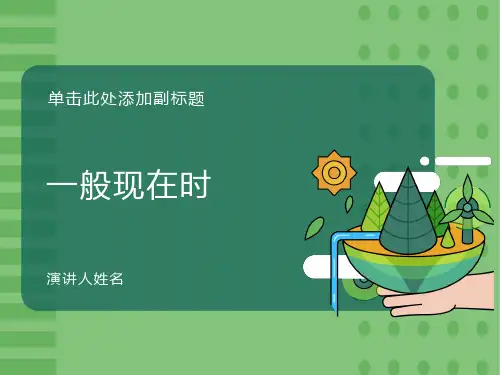

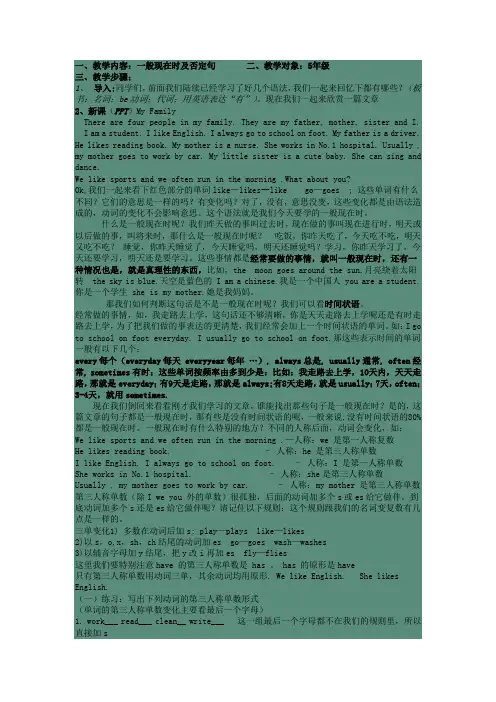
一、教学内容:一般现在时及否定句二、教学对象:5年级三、教学步骤:1、导入:同学们,前面我们陆续已经学习了好几个语法,我们一起来回忆下都有哪些?(板书:名词;be动词;代词;用英语表达“有”)。
现在我们一起来欣赏一篇文章2、新课(PPT)My FamilyThere are four people in my family. They are my father, mother, sister and I.I am a student. I like English. I always go to school on foot. My father is a driver. He likes reading book. My mother is a nurse. She works in No.1 hospital. Usually , my mother goes to work by car. My little sister is a cute baby. She can sing and dance.We like sports and we often run in the morning .What about you?Ok,我们一起来看下红色部分的单词like—likes--like go—goes ; 这些单词有什么不同?它们的意思是一样的吗?有变化吗?对了,没有,意思没变,这些变化都是由语法造成的,动词的变化不会影响意思。
这个语法就是我们今天要学的一般现在时。
什么是一般现在时呢?我们昨天做的事叫过去时,现在做的事叫现在进行时,明天或以后做的事,叫将来时,那什么是一般现在时呢?吃饭,你昨天吃了,今天吃不吃,明天又吃不吃?睡觉,你昨天睡觉了,今天睡觉吗,明天还睡觉吗?学习,你昨天学习了,今天还要学习,明天还是要学习。
这些事情都是经常要做的事情,就叫一般现在时,还有一种情况也是,就是真理性的东西,比如,the moon goes around the sun.月亮绕着太阳转 the sky is blue.天空是蓝色的 I am a chinese.我是一个中国人 you are a student.你是一个学生 she is my mother.她是我妈妈。
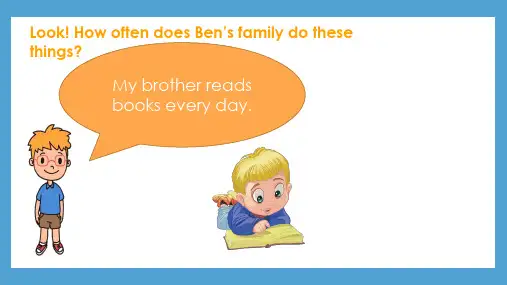
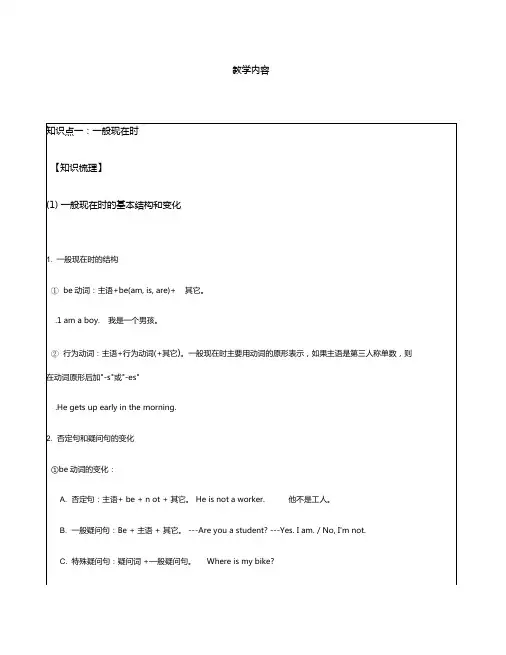
教学内容B. 一般疑问句:Do ( Does ) + 主语+动词原形+其它。
---Do you ofte n play football? --- Yes, I do. / No, I don't.---Does she go to work by bike? --- Yes, she does. / No, she does n't.C.特殊疑问句:疑问词 +—般疑问句。
How does your father go to work?(注意回顾动词第三人称单数形式变化规则)一般情况下在词尾力口 s help T helps, clean cleans, play plays, wear wears, give gives; 以 s,x, ch, sh 结尾的动词在词尾力口 es dress T dresses, fix T fixes, watch T watches, finish T finishes; 以"辅音字母加 y”结尾的动词,把 y 变为 i,再 study T studies, carry T carries, fly T flies )(2) 一般现在时的用法1.表示经常性或习惯性的动作或行为。
常与always, sometimes, often, usually,never等副词连用。
.I go to school every day except Saturdays and Sun days. My mother often getsupat 6 o 'clock.2.表示现在的状态,能力,性格,个性。
.My father teaches maths.Lin Yan danceswell.3.表示普遍真理或客观事实。
.The earth moves around the sun. The sun rises in the east.【注意】此用法如果出现在宾语从句中,即使主句是过去时,从句谓语也要用一般现在时。


初一英语语法教案:一般现在时一、教学目标1.让学生掌握一般现在时的概念、构成和基本用法。
2.培养学生运用一般现在时进行简单句子的表达。
3.提高学生对英语语法的理解和应用能力。
二、教学重难点重点:一般现在时的构成和基本用法。
难点:如何在不同语境中正确运用一般现在时。
三、教学准备1.PPT课件2.教学视频3.练习题四、教学过程Step1:导入1.利用PPT展示一幅描绘日常生活场景的图片,引导学生用英语描述图片中的内容。
2.邀请几名学生分享他们的描述,并引导其他学生关注描述中的动词形式。
Step2:知识讲解1.通过PPT展示一般现在时的定义、构成和用法。
2.举例说明一般现在时的用法,如:Hegoestoschooleveryday.Shelikesapples.3.对比一般现在时和其他时态,帮助学生理解其特点。
Step3:视频教学1.播放一段关于日常生活场景的视频,让学生关注视频中出现的动词形式。
2.视频结束后,邀请学生分享他们观察到的动词形式,并讨论其是否符合一般现在时的用法。
Step4:练习巩固1.设计一些练习题,让学生在课堂上完成,检验他们对一般现在时的掌握情况。
2.邀请几名学生上台展示他们的答案,并给予评价和指导。
Step5:小组讨论什么是一般现在时?如何判断一个句子是否使用了一般现在时?举例说明一般现在时的用法。
2.每组选派一名代表进行分享,其他组员进行补充。
2.邀请学生分享他们在生活中遇到的一般现在时句子,并讨论其含义和用法。
3.布置作业:让学生用一般现在时写一篇关于自己日常生活的小作文。
Step7:课后反馈1.收集学生课堂练习和课后作业的反馈,了解他们对一般现在时的掌握情况。
2.针对学生的反馈,进行针对性的辅导和讲解。
五、教学反思本节课通过图片导入、知识讲解、视频教学、练习巩固、小组讨论等方式,让学生掌握了一般现在时的概念、构成和用法。
在教学过程中,注重学生的参与和互动,提高了他们对英语语法的理解和应用能力。
关于星期的英语课件一、教学内容本节课我们将学习英语教材第3册第7单元“Days of the Week”。
具体内容包括:掌握星期的七种表达方式(Monday, Tuesday, Wednesday, Thursday, Friday, Saturday, Sunday);学会使用疑问词“What day is it today?”询问星期;了解和运用一般现在时描述日常活动。
二、教学目标1. 能够熟练读写星期词汇,并能运用到实际语境中。
2. 学会使用疑问词“What day is it today?”进行星期询问,并能回答。
3. 能够运用一般现在时描述一周内的日常活动。
三、教学难点与重点教学难点:一般现在时的运用及疑问词“What day is it today?”的句型结构。
教学重点:星期词汇的读写和运用。
四、教具与学具准备教具:PPT课件、黑板、挂图。
学具:单词卡片、练习册、彩色笔。
五、教学过程1. 实践情景引入(5分钟)利用PPT展示一周内不同时间段的图片,引导学生说出这些时间段的英文表达,从而导入星期话题。
2. 新课内容展示(15分钟)(1)展示星期词汇卡片,带领学生朗读并讲解词义。
(2)通过问答形式,引导学生使用疑问词“What day is it today?”询问星期。
(3)给出例句,讲解一般现在时的用法,并让学生模仿造句。
3. 例题讲解(10分钟)结合教材例题,讲解星期词汇和一般现在时的运用。
4. 随堂练习(10分钟)(1)让学生两人一组,互相询问星期并进行回答。
(2)给出一些日常活动,让学生用一般现在时描述。
六、板书设计1. 星期词汇:Monday, Tuesday, Wednesday, Thursday, Friday, Saturday, Sunday。
2. 疑问句:“What day is it today?”3. 一般现在时描述日常活动。
七、作业设计1. 作业题目:用英文描述你一周内的日常活动,至少5句话。
小学英语animals完整课件一、教学内容本节课选自小学英语教材《新标准英语》第三册的Unit 2 “Animals”,涉及的具体内容包括:动物名词的学习(如cat, dog, panda等),一般现在时的运用(描述动物的特征和动作),以及通过图片和情景进行动物词汇的认知和运用。
二、教学目标1. 学生能够听懂并准确说出常见动物的英文名称。
2. 学生能够运用一般现在时描述动物的外貌特征和动作。
3. 学生通过观察和互动,培养对动物的爱护意识。
三、教学难点与重点教学难点:一般现在时的正确使用,动物名词的拼写。
教学重点:动物名词的听说认读,一般现在时描述动物特征。
四、教具与学具准备教具:PPT课件,动物卡片,挂图,录音机。
学具:单词卡片,练习本,彩笔。
五、教学过程1. 导入(5分钟)播放动物园的录音,让学生猜测听到了哪些动物的声音。
引导学生用英语说出猜测到的动物名称。
2. 呈现(10分钟)通过PPT展示动物园的场景,呈现新单词(如cat, dog等)。
教师带领学生朗读新单词,并进行相应的动作模仿。
3. 练习(15分钟)学生两人一组,用单词卡片进行动物名词的配对游戏。
教师随机抽取学生,用一般现在时描述PPT上出现的动物。
4. 互动(15分钟)分组进行“动物角色扮演”,每组选择一种动物,用一般现在时描述其特征和动作。
学生轮流扮演动物,其他同学猜测并说出动物的英文名称。
5. 巩固(10分钟)教师播放课本录音,学生跟读并模仿。
学生根据挂图,用一般现在时描述动物的情景。
六、板书设计Unit 2 Animals内容:1. 动物名词:cat, dog, panda, elephant, tiger, lion2. 一般现在时:描述动物特征和动作(如:The cat is sleeping.)七、作业设计1. 抄写单词:请将本节课所学的动物名词每个抄写5遍。
2. 造句练习:请用一般现在时,选用至少3个动物名词各造一个句子。